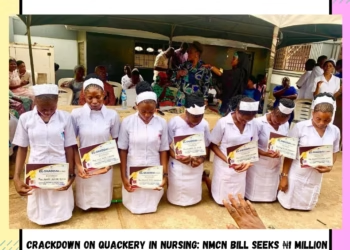Enrollment in Nursing Programmes Surges from 28,000 to 115,000
28th April 2025 | Fellow Nurses Africa Blog
In a move that has stunned many education and healthcare stakeholders, the Federal Government of Nigeria has announced a massive surge in nursing programme enrollment — from 28,000 students in 2023 to an incredible 115,000 in 2025.
The announcement, made through a statement by the Federal Ministry of Education and signed by its Director of Press, Folasade Boriowo, described the development as a milestone achievement under President Bola Ahmed Tinubu’s Renewed Hope Agenda. Minister of Education, Dr. Maruf Olatunji Alausa, emphasized that the growth reflects the administration’s commitment to revitalizing both education and healthcare sectors.

But while government sources hail this rise as a national victory, the realities on the ground tell a more complex story. For many Nigerians, especially the youth, the surge in enrollment is less about a sudden passion for nursing and more about securing a ticket out of the country — fueling what is popularly known as the “JAPA” movement.
Nursing: The New Escape Route
Over the past few years, Nigeria has witnessed an exodus of skilled professionals — doctors, engineers, IT specialists, and now, increasingly, nurses — seeking better working conditions, higher salaries, and improved quality of life abroad.
Nursing has emerged as one of the most reliable pathways for this migration wave. The profession offers structured global mobility routes through exams like the NCLEX, CBT, and IELTS, providing Nigerian nurses access to job opportunities in the United Kingdom, United States, Canada, and Australia, where healthcare systems are actively recruiting due to severe shortages.
An education consultant, speaking with Fellow Nurses Africa, noted:
“For many students, enrolling in a nursing programme is not just about a career — it’s about survival and securing a future. Nursing qualifications open doors internationally in a way that few other careers currently can.”
Achievements and Concerns
The increase in enrollment numbers is undeniably impressive. Dr. Alausa acknowledged the roles played by stakeholders including the Nigerian Council of Nurses and Midwifery, teaching hospitals, and Ministry staff in achieving the new enrollment targets. He also highlighted the government’s emphasis on Science, Technology, Engineering, Mathematics, and Medical Sciences (STEMM) education as a strategic pillar for national development.
However, the flip side of this achievement is the growing anxiety over a potential brain drain. Healthcare experts warn that unless Nigeria simultaneously improves local working conditions and creates incentives for retention, the country risks losing its newly trained nurses to foreign markets — further weakening the domestic healthcare system.
What Lies Ahead?
The story of Nigeria’s nursing enrollment boom is a double-edged sword. It reflects the aspirations of a determined, resilient youth population eager to succeed, but it also signals deeper issues around governance, quality of life, and economic opportunity at home.
As more young Nigerians take the nursing route in their quest for better futures, the government faces the urgent task of not only expanding education access but also making Nigeria a place where skilled professionals want to stay and thrive.
At Fellow Nurses Africa, we will continue to shed light on these critical developments, supporting aspiring nurses on their journeys while advocating for policies that strengthen our healthcare workforce for the future.
Fellow Nurses Africa is the independent voice of African nursing. We educate, inform, and support the nursing profession.










